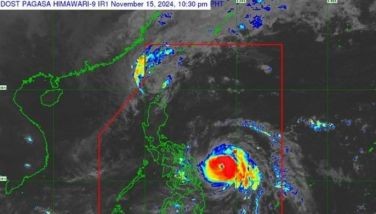Public transport groups say fare hike not enough
MANILA, Philippines – A day after getting their provisional rate hikes, public transport groups remained restless and dissatisfied, saying they are now waiting for government’s next moves to help their sector cope with the weekly oil price hikes.
The continued increases have sent the price of unleaded gasoline to P51 per liter and diesel to nearly P45 per liter.
Lawyer Vigor Mendoza II, president of the 1-UTAK or the United Transport Koalisyon group, said that while public utility bus and jeepney drivers and operators welcomed the grant of the provisional fare hike, the consensus was that it was not enough to make up for the weekly oil price hikes.
“Much as we appreciate the LTFRB’s grant of our provisional fare hikes, they are not enough to give relief to the thousands of drivers and operators,” Mendoza told The STAR.
He said the different jeepney and bus groups are still eagerly awaiting the grant of their main petitions for P1.50 to P2 hikes on basic bus and jeepney fares.
1-UTAK yesterday organized a conference among all the major jeepney and bus groups to map out their next move after the granting of the provisional fare hikes.
Mendoza said the consensus among the groups was their preference for government to abandon its proposed costly program that would make available a P2 fuel subsidy to public transport drivers and operators.
Instead, the transport groups wanted government to just allot the P3.3 billion to P3.5 billion for the fuel subsidy to a massive program to help jeepney and bus operators convert their units to run on cheaper and more environment-friendly liquefied petroleum gas (LPG) and compressed natural gas (CNG).
“This is a long term solution to the problem that transport groups want government to pursue, instead of the expensive fuel subsidy that can only be given for three months,” Mendoza said.
He said if government can help jeepney and bus operators convert their units, they will not be affected by the skyrocketing price of unleaded gasoline and diesel.
“LPG and CNG are much cheaper and even friendlier to the environment. If our jeepneys and buses can use these as fuel, then that would greatly impact on their livelihood,” Mendoza said.
Transport funds
Meanwhile, Energy Secretary Angelo Reyes yesterday called for the creation of a Transport Fund that drivers and operators can tap to convert their vehicles to LPG or CNG.
But he did not say where the money to finance the proposed Transport Fund would come from.
There is a facility in the Oil Deregulation Law amounting to P300 million which is allotted for the establishment of new oil refilling stations.
It was not known if the Department of Energy (DOE) could work out a way to tap into this fund.
At present, there are also window facilities offered by several financial institutions, including government-run banks, which could be used to fund programs to help promote renewable and clean energy.
Reyes suggested the creation of such fund in lieu of a proposal for an additional subsidy from the government of P2 per liter of diesel for public utility vehicles.
The energy chief believes that the amount could better be used to set up a fund through which the transport operators and drivers can borrow to finance the conversion to LPG or CNG.
“This will have a better effect on the quality and condition of their vehicles on the road and reduce air pollution,” Reyes said. – Donnabelle Gatdula
- Latest
- Trending




























